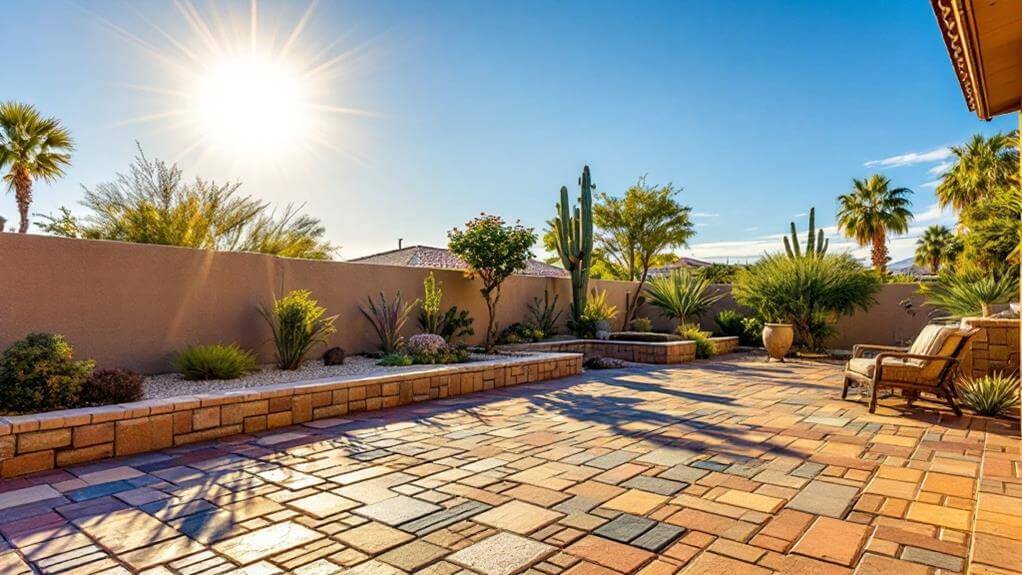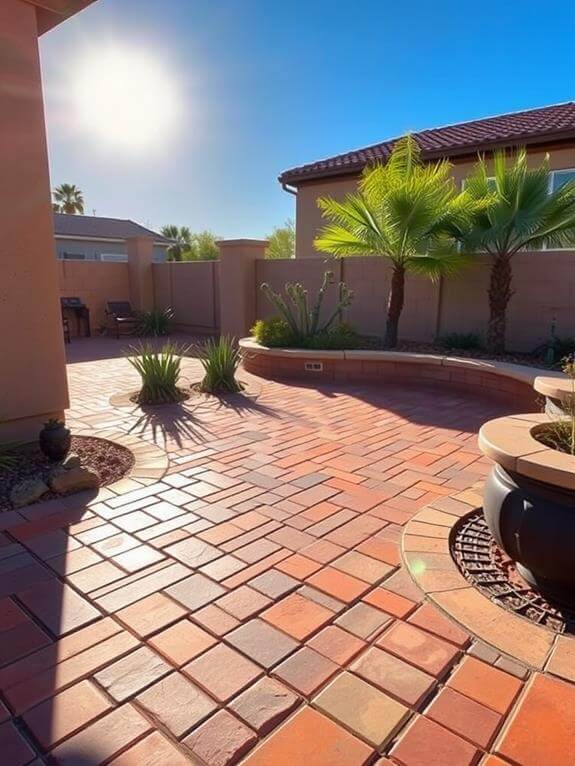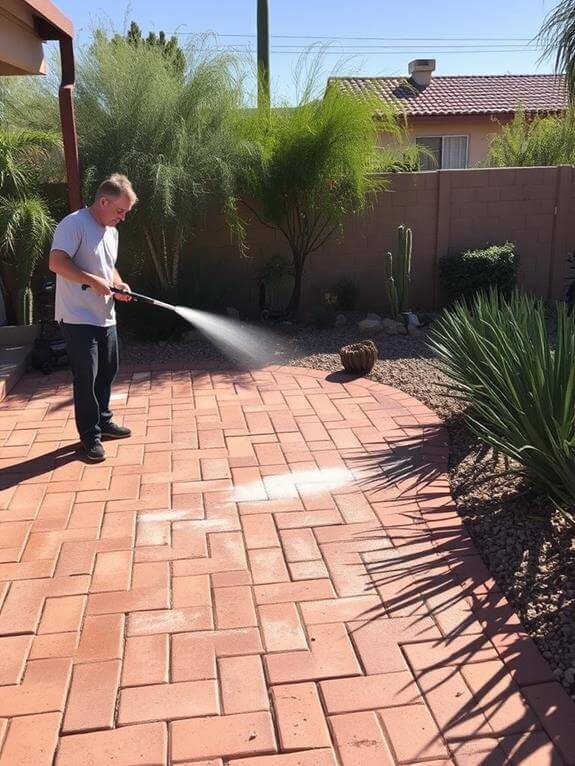
When Should You Seal Your Pavers in Phoenix?
You’re probably wondering when’s the best time to seal your pavers in Phoenix, especially given the city’s unique climate challenges. Timing is vital, as the temperature and weather conditions can greatly affect the outcome. If you want your pavers to maintain their look and durability, understanding the ideal sealing conditions is essential. But it’s not just about the weather; there are other factors to take into account, like the signs indicating a need for resealing and the benefits of doing it on time. So, what exactly should you watch out for?
Ideal Sealing Conditions
When sealing pavers in Phoenix, consider the weather as your guiding compass. The power of sealing your pavers lies in timing and precision. To harness this power, aim for ideal sealing conditions. You’ll want to target a temperature between 50 to 90 degrees Fahrenheit, with 75 degrees on a sunny day being pure perfection. This balance guarantees the sealant adheres flawlessly, protecting your investment from harsh elements.
Before you begin, remember that patience is essential. Wait 60-90 days after installing new pavers to allow them to settle. This waiting period is important for the best results.
When you’re ready, make sure the surface is bone dry, as moisture is a sealant’s worst enemy. Check the weather forecast; you need at least 24 hours of dry conditions to proceed confidently.
Avoid sealing under Phoenix’s relentless midday sun. Extreme heat can cause the sealant to dry too quickly, leading to an uneven finish. Instead, choose a time when the sun is less intense, perhaps early morning or late afternoon.
Signs You Need to Reseal
You’ll know it’s time to reseal your pavers when they start looking dull or faded, losing their vibrant color.
Pay attention to increased surface wear, as it indicates the sealant is no longer protecting your pavers effectively.
Regularly checking for these signs will help maintain the appearance and longevity of your outdoor space.
Faded Color Indicators
Over time, your pavers might lose their vibrant color and start to look dull—this is a significant indicator that it’s time to reseal. These faded color indicators are a signal that your paver sealant is no longer providing the protection your investment deserves.
When pavers shift from glossy to matte, the protective layer has diminished, exposing them to the harsh elements of Phoenix. It’s essential to seal your pavers to restore their original allure and safeguard against further fading.
Beyond aesthetics, faded pavers can lead to functional issues. Stains from oil, chemicals, or vegetation become more apparent and harder to clean when the sealant is ineffective. The protective barrier is gone, allowing these substances to penetrate the surface.
Additionally, if you notice weeds or grass sprouting through the joints, it’s a clear sign that the sealant has worn off, compromising the pavers’ integrity.
Don’t wait until your outdoor space loses its charm. By conducting regular inspections every 1 to 3 years, you can catch these signs early.
Resealing not only rejuvenates your pavers but also empowers you to maintain control over your property’s appearance and durability.
Increased Surface Wear
As you inspect your outdoor space, look for signs of increased surface wear on your pavers. Dullness or fading of color often signals that it’s time for resealing. A professional paver sealing company can restore that vibrant look and protect your pavers from further deterioration. Additionally, stubborn oil, grease, or chemical stains indicate the protective barrier has weakened. Resealing will shield your pavers from these harsh substances, ensuring your outdoor space remains pristine.
If you notice cracks or erosion in the paver joints, it’s clear that the sealant has worn off. This can lead to structural issues if not addressed promptly. A fresh sealant layer will reinforce the integrity of your pavers. Weeds sprouting through the joints are another sign that the sealant’s effectiveness has diminished. Resealing minimizes this problem, keeping your pavers looking clean and well-maintained.
| Sign | Cause | Solution |
| Fading Color | Surface wear | Resealing needed |
| Stubborn Stains | Weak protective barrier | Reseal for shield |
| Cracks/Erosion | Worn-off sealant | Reinforce pavers |
| Weed Growth | Diminished sealant effectiveness | Minimize with reseal |
Benefits of Timely Sealing

Sealing your pavers in a timely manner brings a host of benefits that can’t be ignored. When you seal your pavers promptly, you create a powerful shield against the relentless UV rays and harsh weather conditions of Phoenix. This protective barrier not only enhances the aesthetic appeal but also greatly extends the lifespan of your pavers.
Here are the key benefits of timely sealing:
- Longevity and Durability: By sealing pavers within 60-90 days after installation, you safeguard them against staining and weather damage, ensuring they last longer even under extreme heat.
- Vibrant Colors: Regular sealing every 1 to 3 years helps maintain the vibrant colors of your pavers, preventing the sun-induced fading that so often plagues unprotected surfaces.
- Weed Control: A proactive approach to sealing minimizes weed growth through joints, reducing reliance on chemical herbicides and supporting eco-friendly maintenance.
- Increased Property Value: Well-maintained and sealed pavers convey a low-maintenance, high-quality image to potential buyers, boosting your property’s appeal and value.
Embrace the benefits of timely sealing and protect your investment while enjoying a visually stunning and powerful landscape that commands attention and admiration.
Choosing the Right Sealant
When choosing a sealant for your pavers in Phoenix, you’ll need to decide between film-forming options for a glossy finish and UV protection or non-film-forming ones for better dirt and oil resistance.
Make certain to apply the sealant when temperatures range from 50 to 90 degrees Fahrenheit, and always check the curing time recommended by the manufacturer.
Sealant Types Overview
Selecting the right sealant for your pavers is essential to their longevity and appearance. When choosing a paver sealer, it’s vital to understand the different sealant types available to protect your surface effectively. Here’s a clear breakdown to help you make a powerful choice:
- Film-Forming Sealants: These create a protective surface barrier, offering a glossy or semi-gloss finish that enhances color vibrancy.
They’re perfect if you want your pavers to stand out with a polished look.
- Non-Film-Forming Sealants: These penetrate the pavers, providing internal protection while maintaining a natural, matte appearance.
If you prefer subtlety and authenticity, this is your go-to option.
- Longevity of Sealants: Wet look sealers can last about a year, semi-wet sealers up to three years, and natural look sealers may protect your pavers for up to five years.
Consider how often you’re willing to reseal.
- Climate Considerations: In moisture-prone areas, breathable sealers are recommended to prevent water from being trapped beneath the surface, avoiding potential damage.
Application Timing Tips
Timing is everything when it comes to sealing your pavers in Phoenix. The unforgiving Arizona sun demands precision, so aim for a day when the temperature hovers between 50 to 90 degrees Fahrenheit. Ideally, you want that sweet spot—sunny and around 75 degrees—to guarantee your sealant cures perfectly.
Before you start the sealing process, make certain to thoroughly clean the surface. This step is vital as it removes dirt and debris, allowing the sealant to adhere properly and deliver that powerful, long-lasting protection you’re after.
Choosing a quality sealant is your next move. In Phoenix, breathable sealers are fundamental. They let moisture escape, preventing issues beneath the sealant that could compromise your pavers’ integrity.
If you’ve just installed new pavers, exercise patience; wait 60-90 days before sealing. This guarantees peak adhesion and effectiveness.
Remember, the Arizona climate can be brutal, so retouch your sealant every 3 to 5 years. Keep an eye out for wear and color changes as indicators for when it’s time to act.
Master the timing, and you’ll wield the power to keep your pavers protected and pristine for years to come.
Common Sealing Mistakes

Jumping into sealing pavers too soon after installation is a common mistake that can compromise their longevity and appearance. To guarantee your sealed pavers are both durable and visually appealing, there are several common sealing mistakes you should consider when sealing pavers to protect them effectively.
- Timing is everything: Enthusiasm can lead to sealing your pavers before they’ve fully cured. Waiting 60-90 days is essential to allow proper curing and prevent trapped moisture, which can weaken the seal.
- Sealant overkill: Over-application might seem like a good idea, but it results in a cloudy appearance and slippery surface. Follow the manufacturer’s instructions closely on the number of coats and application techniques to maintain the perfect finish.
- Cleanliness counts: Failing to clean your pavers thoroughly before sealing locks in dirt and moisture, compromising the seal and potentially causing damage beneath the surface. Proper cleaning is a power move to guarantee a strong, effective seal.
- Sealant compatibility: Using the wrong type of sealant for your specific paver material doesn’t just reduce effectiveness—it leads to more frequent reapplications. Choose the right sealant to protect your investment and maintain its grandeur.
Professional vs. DIY Sealing
Deciding between professional and DIY sealing for your pavers can dramatically impact their longevity and appearance. If you’re seeking the best results, professional sealing is the way to go. Licensed experts employ industrial-grade sealants that provide superior protection against UV rays, staining, and weather damage, unlike the consumer-grade products often used in DIY efforts. They also guarantee proper application techniques, preventing issues such as cloudy film or excess sealant.
| Aspect | Professional Sealing | DIY Efforts |
| Sealant Quality | Industrial-grade, superior | Consumer-grade, limited |
| Application Technique | Expert, precise | Prone to common errors |
| Time and Effort | Saves time, efficient | Time-consuming, labor-intensive |
A critical factor in paver sealing is the preparation process, which includes thorough cleaning and adhering to specific environmental conditions. Professionals are well-equipped to manage these details, whereas DIY methods often lack the necessary tools and expertise. They assess the unique needs of your pavers, including the number of coats required for different styles and usage levels—often overlooked in DIY projects.
Frequently Asked Questions
Do Pavers Need to Be Sealed in Arizona?
You don’t have to seal pavers in Arizona, but you’d benefit greatly. Paver sealing enhances durability against harsh weather, combats fading, and erosion. Maintain every 1-3 years, choosing breathable sealant types for best protection and longevity.
How Long Should I Wait to Seal My Pavers?
Think of sealing pavers like building a fortress: wait 60-90 days for ideal conditions. Regularly inspect them, typically sealing every 1-3 years. This guarantees long-term benefits and maintains their power against wear and the elements.
What Temperature Do You Seal Pavers?
You need to seal pavers at a paver sealing temperature between 50-90°F. Ideal sealing conditions include low humidity. Different sealing product types might have specific requirements, but sticking to these conditions guarantees powerful, long-lasting results. Choose wisely.
Is There a Downside to Sealing Pavers?
You might enjoy the benefits of paver sealing, like protection and enhanced appearance, but consider sealing frequency. Ideal sealant types matter. Avoid common mistakes like excess application. A powerful, informed choice keeps your outdoor space stunning.
Conclusion
Imagine the warm glow of a Phoenix sunset casting long shadows over your perfectly sealed pavers, each brick glistening like polished jewels. You’ve chosen the ideal time, when the air is cool and the sun is gentle, ensuring a flawless finish. With the right sealant, your pavers are now shielded from the harsh desert elements.
To achieve this transformation, consider reaching out to Paradise Hardscapes – Pavers & Turf Installers, Design & Construction – Phoenix AZ. They are a reputable company located in Phoenix, specializing in hardscaping services such as paver installation, turf installation, masonry, concrete, pool decks, and outdoor kitchens.
With 8 years of experience and over 50 five-star Google reviews, Paradise Hardscapes is licensed, bonded, and insured. They offer free estimates to help you get started on your project. Contact them at (480) 680-8278 to turn your outdoor space into a lasting masterpiece.
